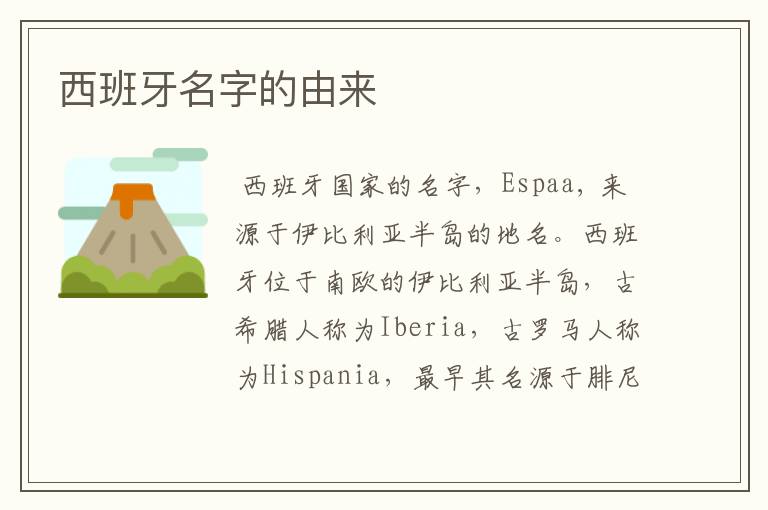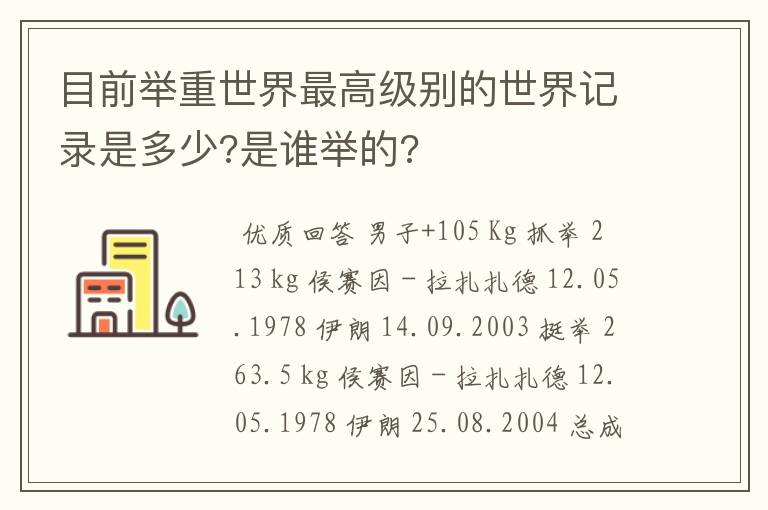西班牙为什么翻译为西班牙
今天运困体育就给我们广大朋友来聊聊西班牙为什么叫西甲,希望能帮助到您找到想要的答案。
西班牙名字的由来

西班牙国家的名字,España, 来源于伊比利亚半岛的地名。西班牙位于南欧的伊比利亚半岛,古希腊人称为Iberia,古罗马人称为Hispania,最早其名源于腓尼基语Shaphan,意为“野兔”,因为腓尼基人来到这里,发现海岸边有很多野兔。另一种说法是说源于希伯来语España,意为“埋藏、矿藏的财富”,因为这里盛产黄金等金属。
在1837年之前,伊莎贝拉二世按照封建时代的惯例,与卡洛斯一世以来的历代西班牙国王一样拥有一个极长的贵族头衔:"尊贵的伊莎贝拉二世,蒙受上帝恩典,是卡斯蒂利亚,莱昂,阿拉贡,两西西里,耶路撒冷,纳瓦拉,格拉纳达,托莱多,巴伦西亚,加利西亚,马略卡,塞维利亚,萨丁岛,科尔多瓦,科西嘉,穆尔西亚,门诺卡,哈恩,洛斯阿尔加韦斯,阿尔赫西拉斯,直布罗陀,加那利群岛,东印度和西印度,海洋中的大陆和岛屿的女王;奥地利女大公;勃艮第,布拉班特和米兰的公爵;阿斯珀格,佛兰德,蒂罗尔和巴塞罗那的伯爵;比斯开省和摩里纳的领主,等等。
1837年,伊莎贝尔二世在通过君主立宪的法案之后将其正式合并为一个国家,决定用西班牙一词“España”(源于腓尼基语,意为“野兔”)命名,自此结束了历经300多年的共主邦联模式。
西班牙,这个名字的由来?
西班牙人把他们的国家称为Les Espan-as。关于西班牙国名的含义,有几种不同的说法:其一,Espan-as一词起源于腓尼基语Shaphan,意为“野兔”。由于古代迦太基人在伊比利亚半岛海岸一带发现过很多野兔,这里就有了“野兔之国”的称号;其二,Spania一词为希腊人首先使用,后来被罗马人改为Hispania,而这个名字最早可能起源于凯尔特语Span;其三,源于希伯来--腓尼基语Espana,意为“埋藏”,转义为“矿藏”、“埋藏的财富”。伊比利亚半岛盛产金、银、铜等宝藏,令腓尼基人羡慕不已,故而为之命名。
为什么spain要翻译成西班牙
西班牙是从西语的Espana来的, 过去称为“日斯巴尼亚”(日字需以粤语读才音近)。后来统一为西班牙。 明朝的葡萄牙在明史译作“布尔都嘎尔”,显然是普通话。但这个译法不知怎么没有流传,到清朝至今又换成了南方的民间译法。葡萄两字当是尽量用有实意的汉字拼凑的音译,就如早期的“诗家谷”之于Chicago。 “牙”,厦门、潮州读 ga 或 ge ,另有许多方言读ŋa 。因此“海牙”是音译。“葡萄牙”、“西班牙”也是。
西班牙国名的汉语译名是怎么来的?
有点奇怪,其实不完全是英语的翻译,西班牙语的西班牙是ESPAÑA,发音类似于“艾斯巴泥亚”,还和“西班牙”后面半段接近一点。可能也有根据这个翻译过来的原因。
其实我最想不通的是JOHN为什么翻译成约翰?!
西班牙国名的由来是什么?
西班牙位于欧洲西南部伊比利亚半岛。古希腊人称,古罗马人称。其国名由来也与这两个词很接近。关于西班牙国名的来历,有两种说法。
一种是取自15世纪末诞生在伊比利亚半岛上的伊斯帕尼亚王国的国名,而该国国名又缘于罗马统治时代的半岛地名希斯帕尼亚(Hispania)州。
古名希斯帕尼亚是一个腓尼基地名。腓尼基人和迦太基人曾在西班牙沿海一带建立过殖民地。因为这里野兔成群,他们把该地叫斯潘(Span)或(Szpam),意为“兔子”。
新地名伊斯帕尼亚的产生,是由于这一地区拉丁语方言不再发罗马地名希斯帕尼亚中的音。而伊斯帕尼亚以后经讹传又演变成现在的埃斯帕尼亚。
英语和荷兰语则省掉罗马地名希斯帕尼亚语头的Hi音节,把它读作西班牙(Spain)。这些岛域位于印度以西的西半球,便称它们为“西印度群岛”。
另一种说法是来源于希伯来—腓尼基语,意为埋藏,转译为矿藏、埋藏的财富。因为伊比利亚半岛盛产黄金、银、铜等,令腓尼基人羡慕不已,因而用“Espana”命名。
spain为什么译成西班牙
西班牙人用西班牙问 Espana, 读做西班牙
Origins of "Sí, Spain"
Origins of " . relations betweeen the Embassy of Spain and the Canadian government were . "Sí, Spain" was presented as a case of study for Development .
参阅这段 Dr. Jožko Šavli博士 所写的文章,解释西班牙名字的来源:
by Dr. Jožko Šavli
In my search for Venetic (Vendic) place names and their meaning, which can be identified on hand of modern Slovenian, I also came across the name Piano di Spagna, north of the well-known Italian lake Lago di Como, not far from Milan. It denotes flatland close to the lake, where the Adda River has its outflow. I knew that the name was not of Italian origin. Indeed, the etymon Spagna (Spain), in its modern meaning, cannot be referred to this place. Since there are many "Slovenian" (Venetic) names in this area, I suppose the name Piano di Spagna is probably also of Venetic origin. But I could not compare it with a Slovenian parallel, as to explain its meaning.
It was a pure coincidence that I previously had made a registration of micro toponyms in the area of my native village close to Tolmin, in the upper Soca (Isonzo) basin of Slovenia. One of those toponyms has the form Špane (pl.). It describes a small piece of gentle, nearly plain superficies, found in the middle of the steep slope of Mt. Vodel. From the morphology of superficies I can only conclude, that the name Špane has to be a dialectal form of Splane, composed of the basic etymon plan (plain) and the s-preformative, which in Slovenian still means a completed state or situation.
Thus, Piano di Spagna, denoting a plain superficies at the outflow of the Adda River into Lake Como, could only be explained by the Venetic dialectal form Špane (in origin Splane). The etymon "Spagna" deriving from the dialectal form Špane, bears witness, that the Venetic language already in the pre-Roman period was differentiated by dialects. Later, when the Latin or Roman (Italian) language prevailed, this name was not comprehensible any more, and the Italian etymon Piano was added, having the same meaning.
In Slovenia one can find other names of such form. But the Italian word Spagna means also Spain. Are there any connections between Spagna (Splane) and Spain (España) From the morphologic point of view, I had established, that the Pyrenees Peninsula is composed of several plains, particularly Castile. If it would concern only the word "plains", the name Spain (España) would be explainable also in other languages, in which the word "plain" appears. But the s-preformative is only to be found in Slovenian, which is considered the modern Venetic language.
Indeed, it seems that a current of our Venetic predecessors, who were the bearers of the famous Urnfield culture (after 1200 BC), reached the Pyrenees Peninsula, too, to which they left their name denoting the plains, and this name has been preserved until today.
今天的内容先分享到这里了,读完本文《西班牙为什么翻译为西班牙》之后,是否是您想找的答案呢?想要了解更多,敬请关注www.zuqiumeng.cn,您的关注是给小编最大的鼓励。
本文来自网络,不代表本站立场,转载请注明出处:https://www.zuqiumeng.cn/wenda/482249.html




